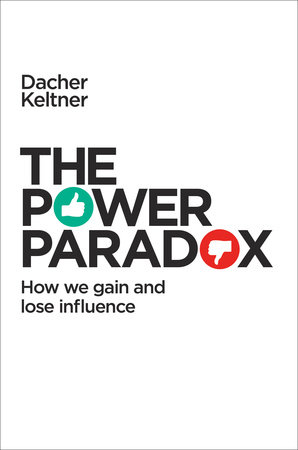
Dacher Keltner is professor of psychology at University of California, Berkeley, where he directs the Berkeley Social Interaction Lab. He is the author of several books including the best-selling Born to Be Good: The Science of a Meaningful Life. His latest work, The Power Paradox, argues that everything we thought about power is wrong and explores the science behind why power corrupts. Here he discusses his findings and arguments.
What attracted you to the study of power?
20 years ago I was studying the nonverbal displays of more submissive emotional states, states like embarrassment, shame, and depression, and saw in those displays a sense of powerlessness, a subjective state psychological science – my discipline – had very little to say about. I then thought about the really poor and good hearted people I grew up around, and all the tough times they faced, and my own experiences of feeling submissive – for example being bullied as a kid – and realized that we need to understand power to understand the human psyche.
The Power Paradox debunks myths about power. What are the most common of these myths?
A first myth is that Machiavellians – those who try to rise in power through deception, manipulation, coercion, and unpredictable aggression – win when it comes to power. A second is that you have to go out and grab power through cunning and strategic acts. Instead, we are learning that groups give power to individuals.
Where did these myths originate?
They originate in no small part to Niccolo Machiavelli’s The Prince, written in a very violent time in European history, which over time has proven to be one of the most influential books offering a blue print about how to gain and keep power. But we have seen a dramatic change in social organisation these past 40 years that makes for a much different way to gain power.
You argue that true power comes from empathy and modesty rather than coercion and deception. Why?
The basis for this argument is empirical and theoretical. We have now seen dozens of studies that show that people of different ages gain and keep power through empathy – the intent focus upon others and understanding of their emotions and thoughts. This is true for kids in school, people at work, friends and romantic partners, and even politicians and US Presidents (Abraham Lincoln, the US’s greatest President, was known to “see and hear all.” ).
More recent studies are finding that modest and humility – for example that the individual does not overestimate her or his talents – also predicts the gain of power. And there are people who make the same point in their more rich observations of power, such as Daniel Goleman in his book Emotional Intelligence and Jim Collins in Good to Great. In terms of theory, there is a new evolutionary argument – sometimes it goes by the name competitive altruism – that makes that case for how groups give power to individuals to the extent that they share. For example, in hunter-gatherer tribes, it is the individual, female or male, who shares food the most and collaborates, who has status and esteem. And this basic principle – pro-social behaviour is rewarded with status and power – benefits not only the group, but also the individual.
Is this a natural continuation of your previous work on compassion and human emotion?
It very much is. As I was making progress in understanding the evolution of emotion, empathy, and compassion, I started to get interested in the social benefits of these emotional practices. And what I started to find is that these pro-social tendencies are respected by others, and sought out in leaders. The literature on sympathy is particularly dramatic. In the US we intuitively, and naively, say nice guys finish last. That turns out to be false. Sympathetic, sharing individuals fare better in terms of happiness, physical health, enjoying enduring influence at work, getting things done as US Senators, and even, getting dates as a teenager in the United States.
You say that the social intelligence we want from leaders is damaged by the experience of power. Why?
Regrettably, time and time again we find that people who are put into positions of leadership, or who come from a life of privilege, lose much of their ability to read people’s emotions accurately. They stop listening as effectively. They lose touch with those people around them.
In many ways, this can be explained by a simple shift in what power makes us focus on. Studies by Ana Guinote in the UK, for example, find that power makes us devote more attention to the rewards around us and our own desire (which explains why people feeling powerful will engage in so many impulsive and at times unethical actions). What this means when it comes to social intelligence is that power makes us prioritize our own interests over the interests of others, and that sets the stage for drops in our ability to empathise, share, collaborate, and adapt.
What can be done to correct this situation?
There are systemic things to do, properties of social systems we need to continually encourage and strengthen. When we make social systems – for example an organisation, or a scientific community, or a political entity – more open, subject to scrutiny and critique (long live journalism! And satire!), and accountable – where leaders have to explain the decisions they come to – the abuses of power are made less likely. And people when in positions of power need to practice certain things like modesty, respect, and empathy, and keep an eye on the fact that their success depends on the successes of those they lead. For example, great leaders are great listeners – they hear others with great intent, they don’t interrupt, they ask great questions, they encourage with subtle head nods and affirmations – all subtle behaviours that produce the best contributions from those they lead.
In your view, what are the key elements to living an ethical and moral life?
I align with many great thinkers – David Hume, Charles Darwin, Adam Smith, Martha Nussbaum – that the keys to the ethical moral life are the moral sentiments. When I teach human happiness at Berkeley, I talk about six great passions that make for the ethical life: compassion, gratitude, awe, a passion for justice, forgiveness, and mirth. If you can cultivate these experiences in your daily living, you will do pretty well in your ethical engagement in the communities you call your own.
Are those the same as requirements for living a happy life?
Ironically, they are a foundation of the happy life. I’d also add a set of principles for handling stress that are key to happiness – contemplation, narratives, perspective taking. But the six moral sentiments I refer to above are powerful determinants of happiness and health, in large part because they give rise to strong social ties -- the ultimate sign of ethical living.

